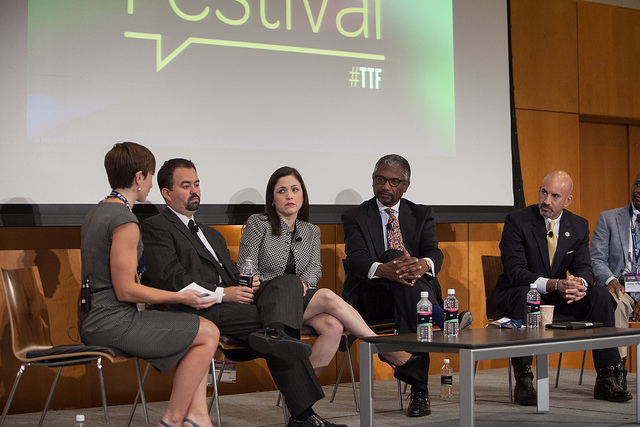Photo Credit: The Texas Tribune
The Texas Tribune Festival’s panel on “Justice and the Legislature” featured a Texas state representatives with a diversity of opinions on topics including gun control and police violence against citizens.
On the recent passage of open carry laws and the expansion of concealed carry, Matt Shaheen (R-Plano) was blunt in his support, saying that “an armed citizenry is the best way to keep ourselves safe.” Harold Dutton Jr. (D-Houston; Chairman of the House Juvenile Justice and Family Issues Committee) disagreed. Referring to the poor sections of east central Houston that he represents, he told Shaheen, “If you think everybody having a gun makes us safer, there are some places in my district where I know everybody has a gun, and I’ll give you one and drop you off if you want.” Shaheen did not make clear whether he planned to take Dutton up on his offer.
Offering a third, and perhaps more pragmatic view, Joe Moody (D-El Paso; Vice Chairman of the House Criminal Jurisprudence Committee) argued that since meaningful gun control isn’t a realistic possibility in Texas, it would be wiser to “focus on the who.” That is, the legislature does have the authority to keep guns out of certain people’s hands, but that would require a greater focus on mental health than the legislature is currently taking.
Moving to the topic of police violence against citizens, Dutton stated that simply looking at police violence is taking too narrow a view. He argued that the legislature would need to look at the “entire criminal justice system,” and that since there are people who have gone all the way through the criminal justice system only to be later exonerated, that means “it all started with police arresting the wrong person.”
Addressing police misconduct—and the lack of accountability—Dutton pointed out that grand juries in Dallas have not made a single conviction of an officer in the past 40 years. Dutton wondered whether it makes sense that if a citizen assaults an officer, it’s a 3rd degree felony, but if an officer assaults a citizen, it’s only a class A misdemeanor. Finally, Dutton made the case that officers simply have too much discretion, which they misuse when dealing with people of color. He argued that because the vast majority of people pulled over for failing to signal a lane change (as Sandra Bland was) are not given tickets, officers are simply using that as an excuse for a discretionary stop.
Shaheen tried to frame the problem as one that needed open dialogue rather than legislation, and argued that no statewide solution is possible because districts vary so widely, citing the difference between his wealthy suburban district and Dutton’s urban one. Calling the issue of police/civilian relations “more of a symptom than a problem,” Shaheen implied that the actual problem was that “urban areas” are suffering a “breakdown of the family,” and said that if you look in a jail you find people “who don’t have fathers, they never had a parent who loved them, they don’t think God loves them, they think they’re worthless.” Dutton countered, saying that we’ve traditionally blamed education failures on single-parent families, and are apparently now trying to blame police/civilian relations on single-parent families: “we keep blaming the victim, so to speak, instead of trying to correct the problem.”
Ana Hernandez (D-Houston) agreed the differences between communities meant that the issue had to be addressed at the community level, and gave her own district’s participation in “National Night Out” as an example. Hernandez and James White (R-Woodville; Vice Chairman of the House Corrections Committee) both stated that in their districts, people know the officers who patrol the streets, and felt that this made a great deal of difference.
White said that he had spent a lot of time looking at YouTube police videos, and found some of the incidents of use of force by officers “very troubling,” but argued that often, “the person who’s instigating the crime” is not the officer. His advice was that “We should tell all of our people…to comply with the police so you can tell your story. The time to adjudicate is not on the side of the road.” Hernandez agreed that more emphasis needed to be put on “teaching people how to act” when pulled over by an officer.
Moody agreed that “The legislature doesn’t have the tools to create something top down,” but expressed concern about Department of Public Safety data that showed if “you are black or Hispanic and you’re stopped, you’re much more likely to be arrested and get a ticket. We have a problem.” Moody argued that this is “something going on we need to look at it,” holding out the possibility of taking investigations into police misconduct away from local jurisdictions and putting them into the hands of independent investigators such as the Texas Rangers.
Edited by Jon Brandt

